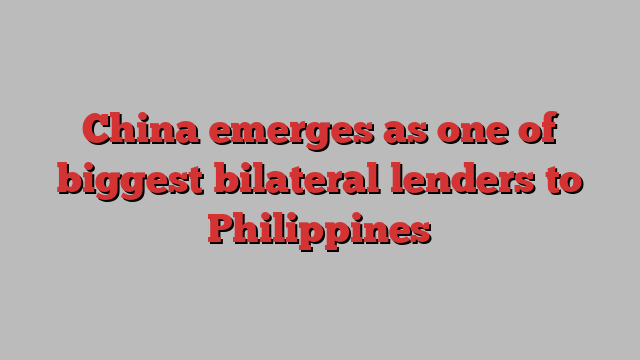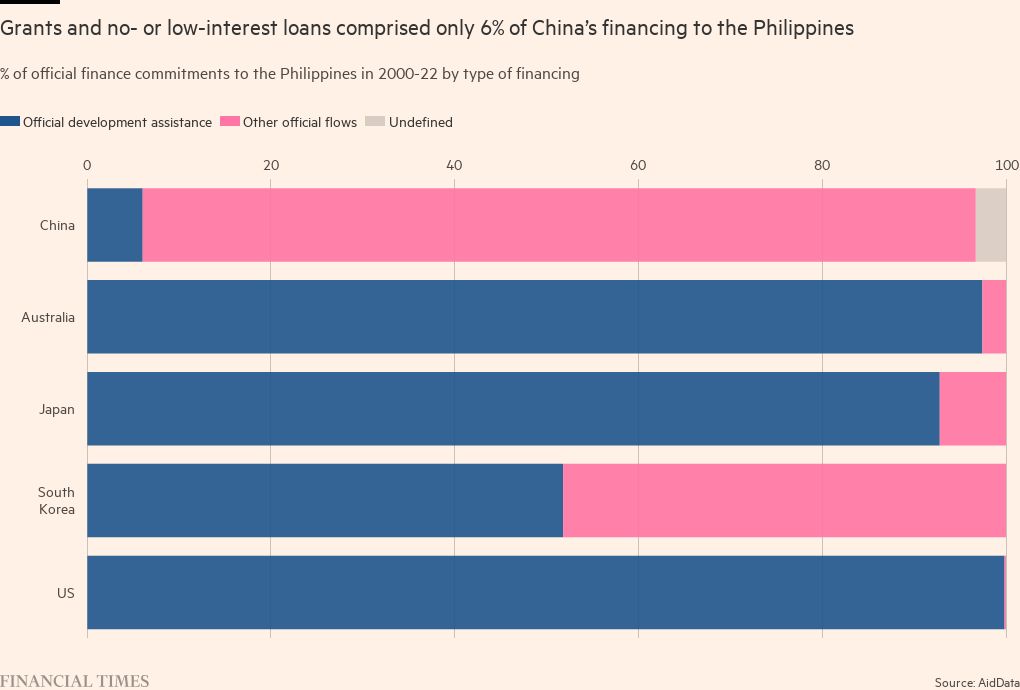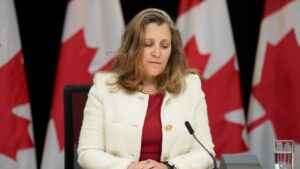
Stay informed with free updates
Simply sign up to the Chinese business & finance myFT Digest — delivered directly to your inbox.
China has become one of the largest bilateral infrastructure lenders to the Philippines, but its finance commitments swing wildly with the two countries’ fickle political relationship, a new report said, warning that lenders could shift focus as Beijing and Manila spar in the South China Sea.
China committed a total of $9.1bn in state-directed finance to the Philippines between 2000 and 2022, according to an investigation published on Wednesday by AidData, a research lab at William & Mary university.
The findings illustrate the special role China’s financial power plays in south-east Asia even as the region’s governments try to balance economic dependence on their large neighbour with their political and security interests. Successive governments in the Philippines, one of the oldest Asian allies of the US, have swung between Beijing and Washington.
“Beijing bankrolled the [Gloria Macapagal] Arroyo and [Rodrigo] Duterte administrations’ priorities with gusto, while frosty relations with . . . Aquino damped collaboration,” AidData added, referring to the country’s presidents between 2000 and 2022.
Arroyo pursued close ties with China seeking loans and investment to support growth. Under her presidency from 2001 to 2010, Chinese development finance in the Philippines increased from US$88mn to US$931mn, according to AidData. But as bilateral ties soured under Aquino, Manila received less money from Beijing over her six-year tenure than it had from just one infrastructure project in Arroyo’s final year in office.
But then, Duterte’s move to cosy up to Beijing again after becoming president in 2016 led to a sharp reversal. More than two-thirds of the Chinese development funds that flowed to the Philippines in the entire 20-year period were received under his six-year tenure, the researchers found.
Samantha Custer, lead author of the report, said China was likely to drastically reduce lending for big-ticket infrastructure projects in the Philippines now as China’s assertive moves in the contested South China Sea have triggered soaring tensions in ties with the Philippines.
At the IISS Shangri-La Dialogue security conference in Singapore last weekend, Philippine president Ferdinand Marcos Jr and China’s defence minister Dong Jun clashed, with Marcos warning that he would view the death of any Filipino resulting from a wilful act by China’s coast guard as close to an act of war, and Dong responding that “our patience has limits” with regard to the dispute.
“What we see right now is similar to what happened under Aquino,” Custer said. “As Marcos is so vocal and China flexes its muscle in the South China Sea, I don’t think China is going to stop all development finance, but the flavour is going to change. When relations are acrimonious, we see more private than public partners, regions outside the capital, and courting of the political opposition.”
In line with China’s development finance profile globally, more than 90 per cent of the state-directed finance it gives to the Philippines is not aid — defined as grants or interest-free loans — but loans with conditions close to market rates. That makes it the largest bilateral lender, but means its overall development finance contributions are much smaller than those from Japan and the US.

Beijing differs from other lenders also in its sustained focus on politically connected counterparts in the Philippines. “Municipal governments in economically dynamic and politically connected areas and national-level government agencies were frequent recipients of PRC-financed projects,” the report said.
In one prominent example, Duterte’s home region of Davao was the region with the second-largest number of Chinese-backed projects, 85 per cent of which were started only after he became president. In a sign that Chinese lenders continue to cultivate the relationship with the Duterte family — Duterte’s daughter is the current vice-president — and other local actors, the influx of Chinese money into Davao has been sustained even after Marcos took office.
The researchers also found that 20 of a total of 136 recipient organisations were at least partially owned by companies or individuals from the Filipino-Chinese diaspora or from China. The list includes Dennis Uy, Duterte’s largest political donor and owner of large telecoms, logistics and infrastructure groups such as Clark Global City Corporation and several other Filipino-Chinese tycoons.
Analysts believe this is mainly due to the economic power and political connections of these families. “I don’t think there is really a strong ethnic relationship, it is more a political logic,” said Alvin Camba, a sociologist at the University of Denver who researches the relations between Chinese actors and elites in south-east Asian countries. “The reason Dennis Uy got certain projects is because he was Duterte’s donor, and in exchange for supporting this president, a distribution of benefits takes place.”

